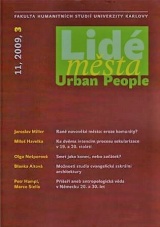Příšeří aneb antropologická věda v Německu 20. a 30. let
DOI:
https://doi.org/10.14712/12128112.3644Klíčová slova:
Anthropology - history of, Germany, race, Darwinism, geneticsAbstrakt
The article presents the complicateted world of German anthropology in the twenties and the thirties of the 20 th century. The Denkwelt of anthropology in this period is shown as ambiguous, without a unifying idea where more approaches to the study of race and its political application were involved. German anthropology during the Third Reich era is as a whole often considered to be an exemplary case of ideologically contaminated and politically exploited science. Even common textbooks dealing with the history of anthropology support such viewpoints by bonding together racial ideologies and racial anthropology. Such oversimplifying attitudes suffer from several inaccuracies. First, the development of anthropological concepts in this period is to be interpreted rather in the context of the history of scientific (in particular biological) theories than of the history of ideologies. To achieve this, we prefer the contextual rather than the more common diachronic approach for treating this matter. Second, German anthropology did not consist solely of blumenbachian physical anthropology – other branches of anthropology bordering on eugenics, genetics and genealogy have to be taken into account. Third, the „race concept” of the Weimar and Third Reich anthropological science was an extremely complicated issue, which cannot be reduced to the level of mere continuity of blumenbachian anthropology or even chamberlainian / lapougian /gobineauian racial ideologies. Fourth, physical “racial anthropology” (not to be misconstrued for racial ideologies) as such was of minor importance for the practical social arrangements of the Third Reich, and its direct impact on ideology was even on decline during the third decade of the 20 th century. These four problems are illustrated on the historical background of the theories and careers of two important anthropologists of this period, Eugen Fischer and Walter Scheidt.
Stahování
Publikováno
Jak citovat
Číslo
Sekce
Licence

Tato práce je licencována pod Mezinárodní licencí Creative Commons Attribution-NonCommercial-NoDerivatives 4.0.


